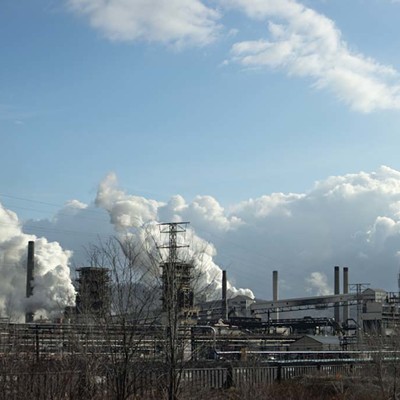Every week, it seems, arrives fresh confirmation that human-caused climate change is real, and new evidence that its effects will be even worse than expected. For instance, a recent report published in Nature predicts that in just three decades, every year will be hotter than 2005, the hottest year ever globally.
Yet week by week, the response from America's ruling class is the same: business as usual.
How to spur action? One new tactic is divestment: prodding universities and other large institutions to pull their money out of the petroleum, coal and gas companies whose products are the single biggest source of the greenhouse gasses warming the planet and acidifying the oceans.
Divestment, led by Bill McKibben's climate group 350.org's Fossil Free Campaign, is gaining momentum. Fossil Free — slogan: "It's wrong to profit from wrecking the climate" — says that more than 300 colleges and universities have divestment campaigns (though only a few small schools have actually divested). More than a dozen cities, from Seattle to State College, Pa., have committed to divestment. And in July, President Obama approvingly slipped the term "disinvest" into a speech on climate change.
Divestment is also on the agenda of Power Shift 2013, a national summit for young climate activists that visits Pittsburgh Oct. 18-21. Some 10,000 participants, from all 50 states, are expected; McKibben is a keynote speaker. "Fossil fuels are bankrupting our future," says Whit Jones, campaign director of the Energy Action Coalition, the aggregation of 50 youth-led groups that convenes Power Shift. And divestment, he says, can "undermine the power of the fossil-fuel industry."
Can it?
Raymond J. Bradley, an internationally known climatologist, said in an Oct. 2 talk at the University of Pittsburgh that divestment campaigns are ultimately a distraction from the real problem: Congress.
Like other critics of divestment, Bradley argues that it's unlikely to lower share prices for the companies that produce the energy on which the world economy depends. He says it's even less likely to prompt submission to 350.org's demands that industry cease exploration for new hydrocarbons and pledge "to keep 80 percent of their current reserves underground forever."
Such demands are indeed in line with the urgency for change expressed in the new report from the United Nation's Intergovernmental Panel on Climate Change, whose grim outlook on rising oceans and extreme weather Bradley discussed at Pitt. But to get there by divestment "seems to me ... a totally unrealistic goal," says Bradley, who directs the Climate System Research Center at the University of Massachusetts at Amherst.
Instead, Bradley says, we need effective federal legislation to reduce fossil-fuel consumption and encourage renewable energy — like a carbon tax whose proceeds would be rebated to citizens. And the reason we don't already have such a law, he says, is because of "maybe a dozen people in Congress who have been obstacles to any legislation." Such deniers are typically backed by fossil-fuel industry cash.
Though Congress houses many climate-deniers, Bradley blames key roadblockers like Rep. Joe Barton, the Texas Republican who chairs the House Committee on Energy & Commerce. Other influential denialists include Oklahoma Sen. James Inhofe and California Rep. Darrell Issa.
Bradley knows whereof he speaks: He was among 17 climate scientists whom Inhofe demanded the Justice Department indict for "unlawful use of federal funds and potential ethical misconduct" — all based on Inhofe's belief that man-made climate change is a "hoax." Barton, too, has targeted Bradley and other scientists. Bradley details such campaigns in his book Global Warming and Political Intimidation.
Unseating entrenched denialists won't be easy. But Bradley says it's less quixotic than divestment.
Divestment supporters counter that this is also a moral issue; as with South African apartheid in the 1980s, and tobacco in the 1990s, a divestment campaign "really opens up the opportunity for broader action on these issues, like legislative action," says the Energy Action Coalition's Jones. "Getting climate denialists out of Congress is important," Jones agrees. But "there isn't going to be a silver bullet. We need a host of people ... pursuing a multitude of strategies."
However, as Bradley says, "People have only so much time and energy."
He might also be talking about the planet.













